中西婚礼文化差异--英文版
- 格式:docx
- 大小:19.12 KB
- 文档页数:6
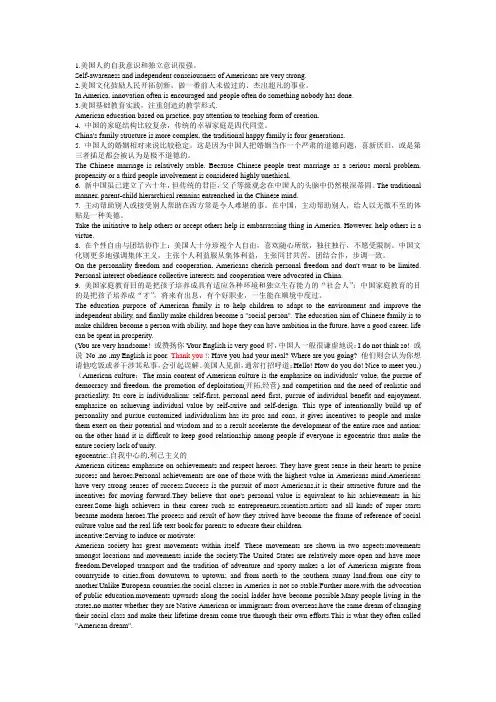
1.美国人的自我意识和独立意识很强。
Self-awareness and independent consciousness of Americans are very strong.2.美国文化鼓励人民开拓创新,做一番前人未做过的、杰出超凡的事业。
In America, innovation often is encouraged and people often do something nobody has done.3.美国基础教育实践,注重创造的教学形式.American education based on practice, pay attention to teaching form of creation.4. 中国的家庭结构比较复杂,传统的幸福家庭是四代同堂。
China's family structure is more complex, the traditional happy family is four generations.5. 中国人的婚姻相对来说比较稳定。
这是因为中国人把婚姻当作一个严肃的道德问题,喜新厌旧,或是第三者插足都会被认为是极不道德的。
The Chinese marriage is relatively stable. Because Chinese people treat marriage as a serious moral problem, propensity or a third people involvement is considered highly unethical.6. 新中国虽已建立了六十年,但传统的君臣,父子等级观念在中国人的头脑中仍然根深蒂固。
The traditional manner, parent-child hierarchical remains entrenched in the Chinese mind.7. 主动帮助别人或接受别人帮助在西方常是令人难堪的事。
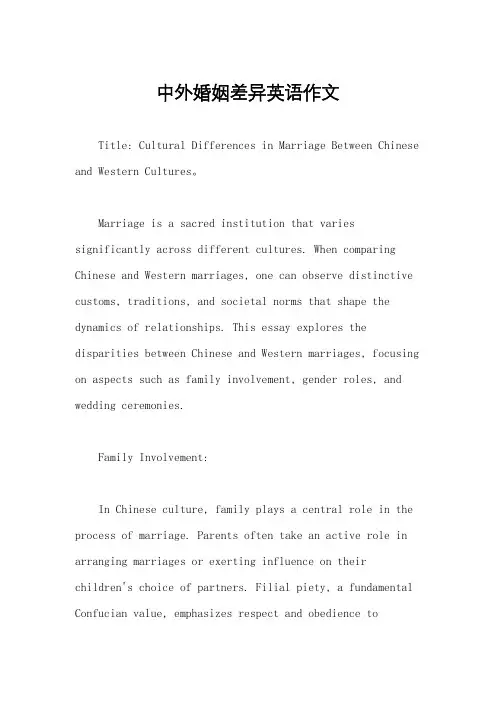
中外婚姻差异英语作文Title: Cultural Differences in Marriage Between Chinese and Western Cultures。
Marriage is a sacred institution that varies significantly across different cultures. When comparing Chinese and Western marriages, one can observe distinctive customs, traditions, and societal norms that shape the dynamics of relationships. This essay explores the disparities between Chinese and Western marriages, focusing on aspects such as family involvement, gender roles, and wedding ceremonies.Family Involvement:In Chinese culture, family plays a central role in the process of marriage. Parents often take an active role in arranging marriages or exerting influence on theirchildren's choice of partners. Filial piety, a fundamental Confucian value, emphasizes respect and obedience toparents' wishes. As a result, Chinese couples may face pressure to marry someone approved by their families, and the decision-making process often involves considering familial expectations and preferences.On the contrary, Western marriages typically prioritize individual autonomy and personal choice. While familial support and approval are valued, the ultimate decision to marry rests with the individuals involved. Western couples have more freedom to choose their partners based on compatibility, love, and shared values, rather than solely on familial considerations. This independence in decision-making can lead to greater personal fulfillment but may also result in strained family relationships if parents disapprove of the chosen partner.Gender Roles:Another significant difference between Chinese and Western marriages lies in gender roles and expectations within the relationship. Traditional Chinese gender roles are often more rigid, with distinct expectations for menand women. Historically, men have been viewed as the primary breadwinners and decision-makers, while women are expected to prioritize family duties and domestic responsibilities.In Western societies, there has been a gradual shift towards more egalitarian gender roles within marriages. Women have gained greater independence and opportunitiesfor education and employment, leading to a more balanced division of household labor and decision-making responsibilities. Modern Western marriages often prioritize equality and mutual respect between partners, with both individuals contributing to financial support and decision-making processes.Wedding Ceremonies:Wedding ceremonies in Chinese and Western cultures also differ in their customs and traditions. Chinese weddings are often steeped in centuries-old rituals and symbolism, reflecting cultural beliefs and values. Traditional Chinese weddings may include customs such as the exchange ofbetrothal gifts, the tea ceremony, and the use of auspicious colors like red and gold. These ceremonies serve to honor ancestors, bring blessings upon the couple, and symbolize the union of two families.Western wedding ceremonies vary widely depending on cultural and religious backgrounds, but they often emphasize personalization and individual expression. Couples have the freedom to tailor their weddings toreflect their unique personalities and preferences. Western weddings may include customs such as exchanging vows, exchanging rings, and hosting receptions with music, dancing, and elaborate decorations. The emphasis is often on celebrating love and commitment in the presence of family and friends.In conclusion, the institution of marriage manifests differently in Chinese and Western cultures due to variations in familial involvement, gender roles, and wedding traditions. While Chinese marriages tend to be influenced by familial expectations and adhere totraditional gender norms, Western marriages prioritizeindividual choice, equality, and personal expression. Understanding these cultural differences is crucial for fostering cross-cultural awareness and respecting diverse perspectives on love and marriage.。
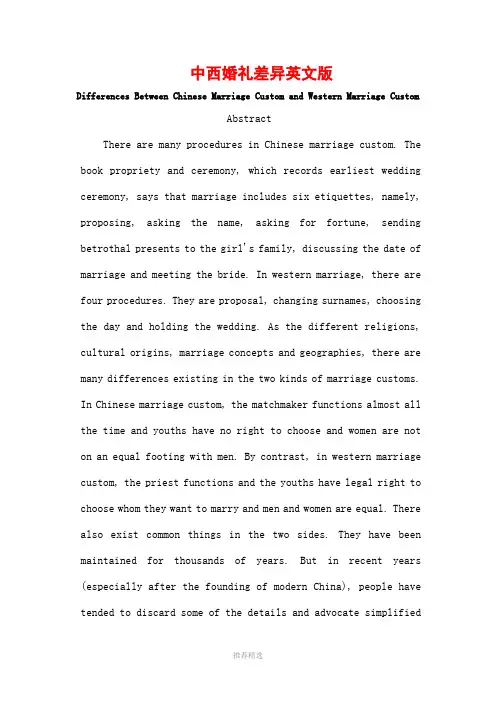
中西婚礼差异英文版Differences Between Chinese Marriage Custom and Western Marriage CustomAbstractThere are many procedures in Chinese marriage custom. The book propriety and ceremony, which records earliest wedding ceremony, says that marriage includes six etiquettes, namely, proposing, asking the name, asking for fortune, sending betrothal presents to the girl's family, discussing the date of marriage and meeting the bride. In western marriage, there are four procedures. They are proposal, changing surnames, choosing the day and holding the wedding. As the different religions, cultural origins, marriage concepts and geographies, there are many differences existing in the two kinds of marriage customs. In Chinese marriage custom, the matchmaker functions almost all the time and youths have no right to choose and women are not on an equal footing with men. By contrast, in western marriage custom, the priest functions and the youths have legal right to choose whom they want to marry and men and women are equal. There also exist common things in the two sides. They have been maintained for thousands of years. But in recent years (especially after the founding of modern China), people have tended to discard some of the details and advocate simplifiedmarriage procedures and wedding ceremonies.Key Words:Marriage custom; differences; reasons摘要中国婚俗有着许多的仪式。
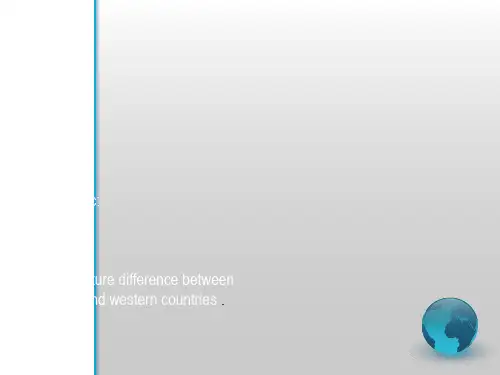
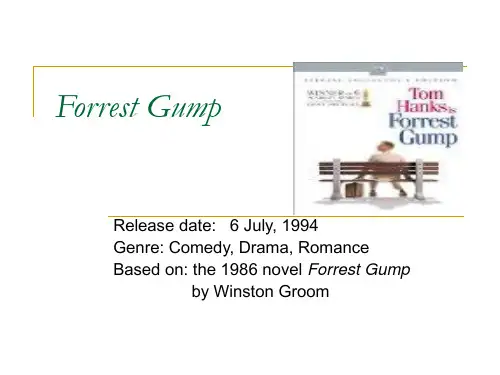
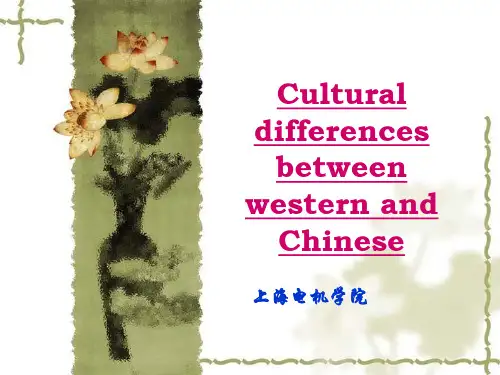
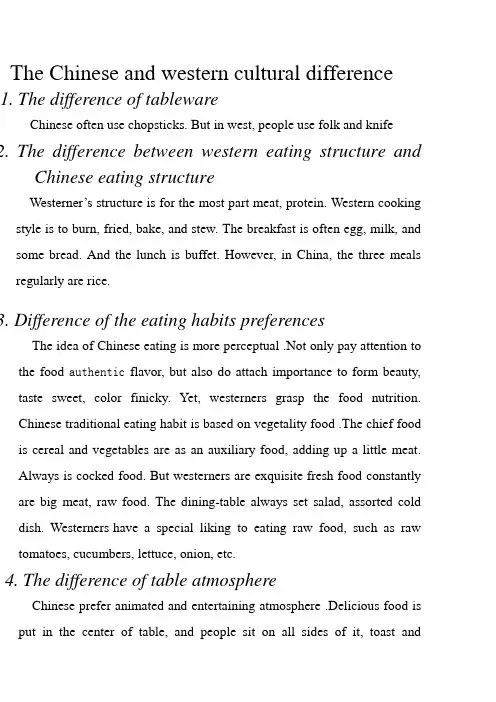
The Chinese and western cultural difference 1. The difference of tablewareChinese often use chopsticks. But in west, people use folk and knife 2. The difference between western eating structure andChinese eating structureWesterner’s structure is for the most part meat, protein. Western cooking style is to burn, fried, bake, and stew. The breakfast is often egg, milk, and some bread. And the lunch is buffet. However, in China, the three meals regularly are rice.3. Difference of the eating habits preferencesThe idea of Chinese eating is more perceptual .Not only pay attention to the food authentic flavor, but also do attach importance to form beauty, taste sweet, color finicky. Yet, westerners grasp the food nutrition.Chinese traditional eating habit is based on vegetality food .The chief food is cereal and vegetables are as an auxiliary food, adding up a little meat.Always is cocked food. But westerners are exquisite fresh food constantly are big meat, raw food. The dining-table always set salad, assorted cold dish. Westerners have a special liking to eating raw food, such as raw tomatoes, cucumbers, lettuce, onion, etc.4. The difference of table atmosphereChinese prefer animated and entertaining atmosphere .Delicious food is put in the center of table, and people sit on all sides of it, toast andencourage guests to drink wines, to express a feeling of respect and pleasure, courtesy. Westerners pursue own freedom .You should be quiet; at least you can not speak loudly. Westerners think that it is impolite to speak when you are stuffed.5. The difference of table equitiesIn western countries, all activities are going by arranged beforehand time .The formal party requires to arrive in time. If you are late for 10 minutes, it will be regarded to be bad manners. It is not respectful to the host .But in china, people tend to be late or arrive early. And also in west, the guests should dress up and frequently it is necessary to dress formal attire. In China, it is enough to dress cleanly.In west, we should seat uprightly, do not put elbows in the table, and try to use folk and knife, not to use hand to hold. When you drink soup, do not sip. Just chew no sound. When you eat fish or meat, do not vomit directly, you can use napkins, and throw it in the folk next put into plate.6. Traditional ideasChinese are deeply influenced by Buddhism and advocate not killing animals.Therefore, chineses are predisposed to vegetables but not meat sand fishes. Westerners succeed national tradition and go hunting out to sea. So Chinese vegetarians have difficulties in adapting themselves to westerneating habit that three meals are pork and steak.There are some tips I research about using tableware 1.American eating habit is funny. They eat almost everything with a fork, and it appears that holding a knife in the right hand longer than a few seconds is considered to be against table manners.2. The system is that if it is absolutely necessary to use a knife, people take a fork in their left hand, and cut off pierce of meat or whatever it is in the normal manner. They put the knife down, transfer the fork to their right hands, and only then do transport the food to their mouth. This is ludicrous, but it is considered good manner.3. In west, it is absolutely necessary to use a knife, Americans do not use one, because obviously this get thing complicated. And you will therefore see them try to cut food like potatoes, fish, and even bacon with a fork.4. Tables are generally laid with one knife and two forks, the outside fork is for the salad .If you do use your knife, remember to save it for the meat.5. Even desserts are eaten with a fork if at all possible, and the spoon to be for coffee (but you use it for your dessert, no one will say anything) But in china, people always use chopsticks, also add some spoons.MichelleClass two。
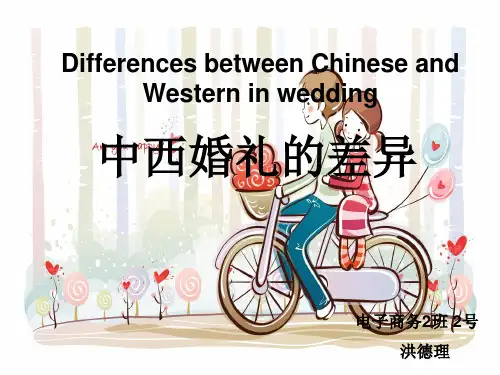
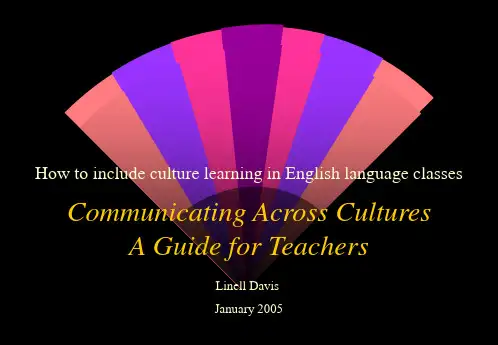
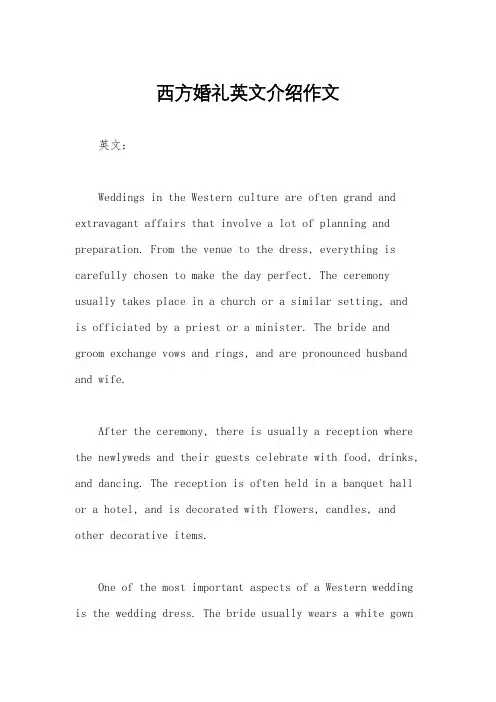
西方婚礼英文介绍作文英文:Weddings in the Western culture are often grand and extravagant affairs that involve a lot of planning and preparation. From the venue to the dress, everything is carefully chosen to make the day perfect. The ceremony usually takes place in a church or a similar setting, andis officiated by a priest or a minister. The bride and groom exchange vows and rings, and are pronounced husband and wife.After the ceremony, there is usually a reception where the newlyweds and their guests celebrate with food, drinks, and dancing. The reception is often held in a banquet hall or a hotel, and is decorated with flowers, candles, and other decorative items.One of the most important aspects of a Western wedding is the wedding dress. The bride usually wears a white gownthat is long and flowing, with a veil and a train. The groom wears a suit or a tuxedo, and the bridesmaids and groomsmen are dressed in matching outfits.Overall, a Western wedding is a beautiful and memorable occasion that celebrates the love and commitment between two people.中文:西方的婚礼通常是盛大而华丽的,需要大量的计划和准备。
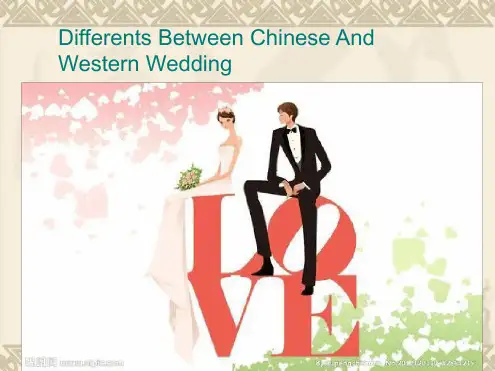
从传统婚俗看中西方文化差异的论文从传统婚俗看中西方文化差异的论文从传统婚俗看中西方文化差异引言婚姻是人类社会共有的制度之一。
从古至今,婚姻对于任何人都是至关重要的。
因此几乎在每一种社会文化中,都有举办婚礼的习俗。
但是,婚礼的形式却随着人类社会的进展不断地发生着变化,不过万变不离其宗,本文将试从四个方面来比较中西婚俗差异,同时进行婚俗差异原因的深层探究,使我们也对中西文化有一个基本的了解。
更重要的是人们可以透过纷繁绚丽的婚俗,更清楚地认识人类社会历史,探索人类社会发展的基本规律。
一.中西传统婚俗礼仪的差异(一)传统婚礼仪式(traditional wedding ceremony)古代中国,婚礼的准备过程是极其复杂的,有特定的步骤,称之为三书六礼。
所谓三书,就是指聘书、礼书、迎亲书。
(聘书:订亲之书,男女双方正式缔结婚约。
纳吉(过文定)时用。
礼书:过礼之书,即礼物清单,详尽列明礼物种类及数量。
纳征(过大礼)时用。
迎亲书:迎娶新娘之书。
结婚当日(亲迎)接新娘过门时用。
)而六礼是指纳彩、问名、纳吉、纳征、请期、亲迎。
(纳采:古时婚礼之首,属意女方时,延请媒人作谋,谓之纳彩,今称「提亲」。
问名:男方探问女方之姓名及生日时辰,以卜吉兆,谓之问名,今称「合八字」。
纳吉:问名若属吉兆,遣媒人致赠薄礼,谓之纳吉,今称「过文定」或「小定」。
纳征:奉送礼金、礼饼、礼物及祭品等,即正式送聘礼,谓纳征,今称「过大礼」。
请期:由男家请算命先生择日,谓之请期,又称「乞日」、今称「择日」。
亲迎:新郎乘礼车,赴女家迎接新娘,谓之亲迎。
)通过三书六礼我们可以略窥一斑,中国古代婚礼的准备过程非常复杂、繁琐,十分注重礼节,每一步都有具体的要求。
在整个过程中,从纳彩到亲迎,都由双方父母安排,最后也由父母决定是否能够结婚。
同时,在婚礼进行时也有一定的顺序,按一般的情况,在整个婚礼过程中有:祭祖、出发、燃炮、等待新郎、讨喜、拜别、出门、礼车、掷扇、燃炮、摸橘子、牵新娘、喜宴、送客、闹洞房、三朝回门。
Differences in Wedding Culture betweenChina and the WestHello, everyone. My name is Sunny from Class 3 of International Economics and Trade. In my spare time, I like listening to music and reading books. My favo rite sport is playing badminton, so In my spare time, I will ask some good friend s to play badminton with me. Of course, because Of my outgoing personality, I prefer outdoor activities, so I often go out with my friends to climb mountains o r go to some beautiful places to play!Holding a wedding ceremony is regarded as a very solemn ceremony in China or the West. However, there are many differences between Chinese and Western wedding cultures.Chinese wedding has many steps and the process is much more complicated than western wedding, especially in the wedding ceremony in Chinese traditional wedding custom, people's pressure is more and more there are many taboos, Chinese people are more conservative and traditional, but open western wedding is very simple.In Western countries, weddings are usually held in a church. Western weddings include a ceremony and a banquet. The ceremony is often held in a church, and friends and relatives are invited to attend. The banquet is more solemn than the ceremony. Bridesmaids, the best man, pages and ushers are applied,according to the old customs, the evil spirits would be confused by somany similarly dressed people. But some couples choose the park as their wedding venue. However, Chinese weddings are held at home or in hotels. In modern life, more and more people hold wedding parties in hotels.Meanwhile, in Western weddings, the bride usually wears a white wedding dress, which symbolizes happiness and purity. The white veil is usually paired with the white wedding dress. According to tradition, the bride brings something new, something old, something borrowed and something blue to bring her good luck during the wedding! The groom usually wears a formal suit and tie, also known as a tuxedo. However, at the traditional Chinese wedding of the bride and groom, the red dress symbolizing good luck heralds a prosperous marriage. Traditional Chinese wedding food is also very special. At a traditional wedding, the bride usually eats dates, peanuts and melon seeds. The meaning of these foods can be clearly seen in their Chinese pronunciation. Put them all together, it sounds like "Have a baby soon."Finally, although we are from different cultures, we should fully understand each other and respect each other's customs to achieve the best effect of communication.。
中西婚礼差异英文版Differences Between Chinese Marriage Custom and Western Marriage CustomAbstractThere are many procedures in Chinese marriage custom. The book propriety and ceremony, which records earliest wedding ceremony, says that marriage includes six etiquettes, namely, proposing, asking the name, asking for fortune, sending betrothal presents to the girl's family, discussing the date of marriage and meeting the bride. In western marriage, there are four procedures. They are proposal, changing surnames, choosing the day and holding the wedding. As the different religions, cultural origins, marriage concepts and geographies, there are many differences existing in the two kinds of marriage customs. In Chinese marriage custom, the matchmaker functions almost all the time and youths have no right to choose and women are not on an equal footing with men. By contrast, in western marriage custom, the priest functions and the youths have legal right to choose whom they want to marry and men and women are equal. There also exist common things in the two sides. They have been maintained for thousands of years. But in recent years (especially after the founding of modern China), people have tended to discard some of the details and advocate simplifiedmarriage procedures and wedding ceremonies.Key Words:Marriage custom; differences; reasons摘要中国婚俗有着许多的仪式。
西方婚俗作文英文英文:In Western culture, weddings are a significant event that is often celebrated with a lot of traditions and customs. From the engagement to the ceremony itself, there are many unique practices that are followed.One of the most well-known customs is the engagement ring. When a man proposes to his partner, it is customary for him to present her with a diamond ring. This tradition dates back to ancient Rome, where it was believed that the fourth finger on the left hand had a vein that led directly to the heart. This symbolizes the eternal love and commitment between the couple.Another popular tradition is the bridal shower. This is a party that is thrown for the bride before the wedding, where she is showered with gifts and well-wishes from her friends and family. It is a time for the bride to relax andenjoy herself before the big day.The wedding ceremony itself is also filled with customs and traditions. The bride typically wears a white dress, which symbolizes purity and innocence. The groom often wears a black tuxedo, symbolizing formality and sophistication. During the ceremony, the couple exchanges vows and rings, and the officiant pronounces them as husband and wife.After the ceremony, there is usually a reception where the newlyweds and their guests celebrate with food, drinks, and dancing. The cutting of the wedding cake is a popular tradition, where the couple feeds each other a piece of cake as a symbol of their commitment to provide for one another.Overall, Western wedding customs are deeply rooted in symbolism and tradition, and they serve as a way to celebrate the love and commitment between two people.中文:在西方文化中,婚礼是一个非常重要的事件,通常会有很多传统和习俗。
The culture differences reflected in the detail ofwedding ceremoniesNameAuthor NoteCorrespondence concerning this sample paper should be addressed to Name,Department of Optical Science and Engineering, Phone:**********. E-mail:This article attempts compare different aspects of the wedding of Chinese and Western to find out the differences and analyze the causes of the differences.Wedding is an important part of culture, it has come into a different wedding customs under the influence of different cultures between the west and east. In order to find out differences between Chinese and Western wedding culture, this article will show it through the comparison on the form of wedding ceremony and wedding party.First of all,let's focus on the wedding forms.The feature of traditional wedding customs in China is “complicated”. The specific process is : the man propose marriage, and if the woman agreed to the proposed marriage, the man could go to the woman's family with the bride price. And then he would ask the woman's date of birth, and divine good and bad fortune of her name and their marriage. And as a token of engagement, the man would send jewelry, silk, and even sheep or pig. The man give the dowry to the woman’s family, and two family would choose an auspicious day for the wedding. And at last, the new husband will go to his wife’s family in person to marry her. [1] The feature of traditional wedding customs in western is “romantic”. On the wedding, playing the wedding march, relatives and friends light the candles, the priest and the choir comes in, then the bridesmaids and the best man come in, the bride’s parents accompany the bride comes intoplay, and all the audience stood up. Father solemnly handed the daughter to the groom, the parents of woman sat down, all the guests seated. Pastor is the chief witness at the wedding ceremony, the new couple will make the oath of marriage, the bride and groom exchanged wedding rings. Under the leading of choir, the guests singing blessing songs. They walked out of the church, followed by the best man and bridesmaids, family members and guests then exit the church. And at last, comes the wedding party. [2]Here, we can find out that, in China, people did not have a fixed belief, but Chinese people would respect the constraints of "moral".The Confucianism is the biggest influence on the Chinese.Confucianism thought moral indicator of filial piety is very important.Marriage is no longer a personal matter, but the big event of whole family, love is not the basis for marriage. Chinese people are very cautious about marriage. So both men and women must put family interests first when choosing their own lover. Chinese people pay special attention to "harmony between natural and human", forming a traditional concept of "big natural". So complicated wedding ceremony, worship and bow down to natural reflects the respect for the solemn marriage and natural. However, people live in Western would not think so, capitalist culture is formed during the "Renaissance" in the 16th century. They preached "humanism", they follow the family values of freedom and equality.Couples married for love, not the reputation and status of the family.As the wedding party is an indispensable part of the wedding, are there any differences?In China, the traditional wedding is a very grand banquet, usually held at noon, last for one to three days. The groom's parents will entertain all their friends. On the feast, people eat, drink, chat, and then go home after dinner, and the groom will pay the cost of the wedding party. But guests are given enough gifts to pay the man wedding, and even a slight surplus. On the banquet, the bride and groom will toast to each of the guest. Chinese people would like a more lively wedding, so that they feel auspicious. People's religious belief is very clear, and the impact on the personal life is great. So their wedding should follow the religious dogma of faith. Christianity has a great influence for Westerners, a marriage which have God's testimony is very important for them.[1]The type of food is followed the bride and groom’s cultural tradition and the economic conditions of bride's family, because, usually, the bride's family would pay for the wedding banquet in the United States. The bride and groom will take the first dance at the beginning of banquet, and then the party begin. For westerners, rather than the wedding car pickup and put on a large banquet, the most important program of the wedding is the congratulations of priest, and the promise and rings exchanged. Wedding banquet will be in the form of a buffet, sothe guest can use a small amount of money to held a big banquet, colleagues, guests could eat any food according to their own needs, so there will not have any waste. [2]So, we can obviously find out that Chinese people pay more attention to the festive and lively. Chinese people regard the wedding as a grand ceremony to connect the couple with the marriage, and marriage is not the tomb of love, but perfect ending of love. Western concept of traditional marriage is more open and free. They show more attention on the importance of individual freedom. And they value the practical benefits.References[1]绍先崇.近代中国的新式婚丧[M].北京:人民文学出版社,2006.[2]潘文晋.从中西婚礼文化看中西方文化差异[J].今日南国,2008(3):160-173.。